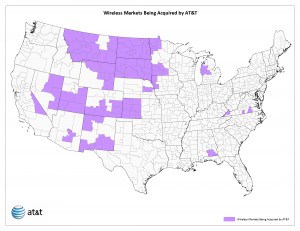 Independent phone company Windstream this morning announced its intention to acquire business telecommunications provider PAETEC Holding Corp., in a transaction valued at nearly $2.3 billion.
Independent phone company Windstream this morning announced its intention to acquire business telecommunications provider PAETEC Holding Corp., in a transaction valued at nearly $2.3 billion.
“This transaction significantly advances our strategy to drive top-line revenue growth by expanding our focus on business and broadband services,” said Jeff Gardner, president and CEO of Windstream. “The combined company will have a nationwide network with a deep fiber footprint to offer enhanced capabilities in strategic growth areas, including IP-based services, data centers, cloud computing and managed services. Financially, we improve our growth profile and lower the payout ratio on our strong dividend, offering investors a unique combination of growth and yield.”
PAETEC, based in suburban Rochester, N.Y., has been a business telecommunications provider since 1998, and many of its founding employees joined the company from locally-based Rochester Telephone Corporation, its long distance subsidiary RCI, and a competing long distance competitor ACC — today all long-gone.
For residents of Rochester, the implications of the merger could literally leave a hole in the center of downtown, where construction of PAETEC’s pre-merger headquarters was just getting underway. With the recent demolition of Midtown Plaza, what local residents today call “the big hole in the ground” could be there a long, long time if Windstream abandons construction plans.
In December, then-mayor Robert Duffy (now New York’s Lieutenant Governor) took PAETEC founder and CEO Arunas Chesonis at his word that the company’s new headquarters would be built in downtown Rochester — a project that would never have been started without substantial tax credits, loans and grants backed by New York taxpayers.
 “More than three years ago, Arunas Chesonis called me on the phone and said if the City and State would demolish Midtown Plaza, he would build the corporate headquarters of PAETEC on that site,” said Mayor Duffy late last year. “Despite the worst economic downturn since the Great Depression and having endless options to locate his company, Arunas Chesonis stayed true to his word. The rebirth of downtown Rochester now has a key cornerstone to build on.”
“More than three years ago, Arunas Chesonis called me on the phone and said if the City and State would demolish Midtown Plaza, he would build the corporate headquarters of PAETEC on that site,” said Mayor Duffy late last year. “Despite the worst economic downturn since the Great Depression and having endless options to locate his company, Arunas Chesonis stayed true to his word. The rebirth of downtown Rochester now has a key cornerstone to build on.”
Now those plans may be gone with the Windstream.

Midtown Plaza was demolished to make room for PAETEC's new downtown Rochester headquarters, a project which may now be up in the air. (Picture courtesy: YNN)
The all-stock deal is expected to close in six months, and Windstream hopes to capitalize on PAETEC’s extensive fiber network and data centers to bolster service to its own business customers. The increased capacity would also deliver improved service for the company’s residential DSL customers with a more robust Internet backbone.
Windstream, based in Little Rock, Ark., has been transforming itself away from its roots as a residential landline provider into a business and broadband services company, and today’s deal is an extension of that.
The company expects to win at least $100 million in new synergies from the merger, based on reduced capital expenditures required to build out Windstream’s own network, and from reduced costs from being a larger volume player.
But Windstream is also well-known for other cost-savings, through massive job cuts at the firms it acquires. Last June, hundreds of workers at Iowa Telecom learned that. After Windstream’s acquisition of D&E Communications in Pennsylvania, nearly 80% of D&E’s employees were shown the door.
For nearly 5,000 PAETEC employees, almost 900 of which live and work in Rochester, updating resumes may have just become job number one.
That’s ironic for a company whose founder wrote his own book: It Isn’t Just Business, It’s Personal: How PAETEC Thrived When All the Big Telecoms Couldn’t.
The first chapter is called “Putting People First,” and explains how the management of PAETEC recognizes the value its employees bring to the company: “Success in business begins and ends with people: the people you hire, the ones you partner with, and the ones you serve as your customers.”
Employees this morning may be wondering if Windstream shares Chesonis’ philosophy.
On this morning’s conference call, Windstream executives spoke about efforts to identify and preserve talented members of PAETEC’s executive management team as part of the newly-expanded company. They had nothing to say about rank and file employees.
[flv width=”640″ height=”380″]http://www.phillipdampier.com/video/WHAM Rochester PAETEC Deal 8-1-11.mp4[/flv]
WHAM-TV spoke with George Conboy of Brighton Securities about this morning’s merger announcement, and the major implications the deal will have on PAETEC’s home base — Rochester, N.Y. (5 minutes)


 Subscribe
Subscribe







